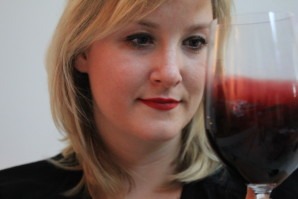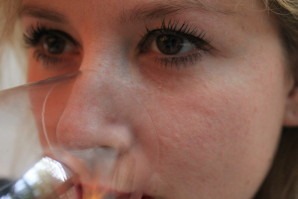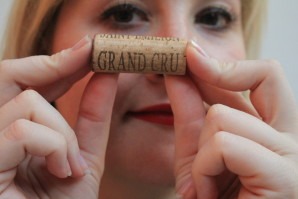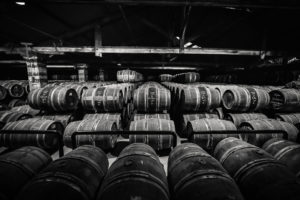To taste,it’s talking about yourself… I really like this sentence because it’s true. Then, I wanted to write an article about the tasting.
Because this exercise is not easy. There are no keys or solutions to taste perfectly a wine. You just have to ask you the good questions. It’s common to say that the quality or the exceptionnality of senses is innate. But in fact, it’s not totaly true. A small part of the population is not lucky and knows anosmia (sense of smell’s problems) and ageusia (taste’s problems). But in general, each person has got the same capacity to smell and to taste…at first ! Even, you need to ‘build’ your senses. The more you stimulate them, the more they are strong, fine and sharp. Our eating habits, the place where we lived, the journeys… Everything is important.

The sight is the first sense we use during the tasting (we can ‘forgot’ the hearing which is only for sparkling wines) : to describe the color of a wine is easy. The adjectives of the french language are rich, it’s different in english… Red, Yellow, Gold, Ruby, Topaz, Tile color… Then the taste and the smell are the senses which are the most important. The sense of smell is the most difficult to describe because we are using the vocabulary of the other senses to describe it. We say that the nose is round, biting, sugary, gourmand… It’s the vocabulary of taste and touch. Forgot also what you read in books : there is no map of the tongue’s tastes. Sugar on the top of the tongue, salt in the back, bitter on the sides… This is false, false, false !! Each person has got it’s own map of tastes on its tongue !

But before the tasting, you have to respect some basic rules. You have to be in a perfect situation, well, you have to try ! There is a famous rule : the P = 3P. Which means that the Perception is the Person (You, me…) + the Place (the place, the glass, the temperature…) + the Product (the wine or the spirit). Let’s see how you can control the Place, which is the only P you can manage.
The tasting place:
Ideally, you should be in a neutral area : without smells, noises and agressive colors. To watch correctly the color of a wine or of a spirit, you should have a white napkin or a white tablecoth. The lightings are also very important : natural white lightings or halogen are the best. Hygrometry and the atmospheric pressure are playing a little role in the wine tasting, so I will not talk about it.
The glass :
There are INAO glasses, famous brands like Riedel but also innovating glasses… What do you have to choose ? A flute for the Champagne ? A large glass for a Burgundy wine ? A classical glass for a Bordeaux wine ? Don’t bother with yourself… The ideal wine has got a tulip form : wider and rounded in the bottom, grasp on the top, so you can turn the wine without puting drops every where and also catch the flavours. Don’t take a very big glass or the wineglass of the pub or even the ‘tastevin’ of Burgundy. You should also smell the glass before the tasting to verify that there are no parasite smells.
Don’t complicated your life ! Take an INAO glass, the proportions are perfect (the size but also the thickness which influes on the wine’s texture). A breath represents 300ml of air. The INAO glass has got a capacity of 225ml…
But personnally, I have a predilection for Riedel… Each person is using its own glass !
The operating temperature :
The place must have a ‘room temperature’ and the glass is not from the dishwater because it will heat up the wine. The temperature of the wine is also really important : a white wine (between 8° to 14°C) is not like a red wine (between 15 and 20°C) and a Champagne (between 7° to 14°C for very nice Cuvée).

To taste it’s talking about yourself… A very difficult exercise… The other elements of P = 3P, People and Product are independant of your will ! But you have to know that if you’re stressed or sick, it will influence your Perception !
The goal of the tasting is to recognize smells, tastes, flavors and textures. But it’s also pleasure… Because I’m a profesionnal, I’m forgetting hedonism (well it’s secondary). But when you’re an amateur, it’s the most important !! So, if you like a wine and that someone tells you that it’s not a good wine… Well you have the right to answer “But I like it ! Gotcha !”. A wine has got a defect when you are disappointed. So appreciate a wine, drink it with people you love and enjoy the moment !



